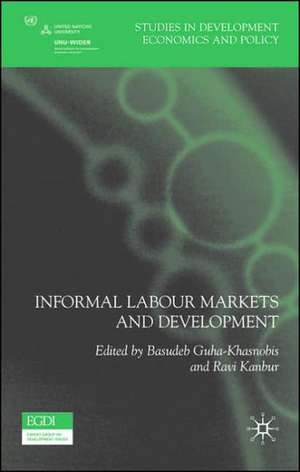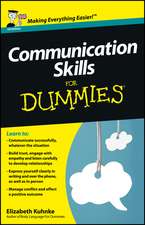Informal Labour Markets and Development: Studies in Development Economics and Policy
Editat de B. Guha-Khasnobis, Ravi Kanburen Limba Engleză Hardback – 11 iul 2006
Din seria Studies in Development Economics and Policy
- 18%
 Preț: 688.91 lei
Preț: 688.91 lei -
 Preț: 385.62 lei
Preț: 385.62 lei - 15%
 Preț: 641.38 lei
Preț: 641.38 lei - 15%
 Preț: 641.20 lei
Preț: 641.20 lei - 15%
 Preț: 641.20 lei
Preț: 641.20 lei - 15%
 Preț: 645.60 lei
Preț: 645.60 lei - 15%
 Preț: 637.78 lei
Preț: 637.78 lei - 15%
 Preț: 651.99 lei
Preț: 651.99 lei - 15%
 Preț: 646.75 lei
Preț: 646.75 lei - 15%
 Preț: 643.34 lei
Preț: 643.34 lei - 15%
 Preț: 644.63 lei
Preț: 644.63 lei - 15%
 Preț: 645.28 lei
Preț: 645.28 lei - 15%
 Preț: 638.57 lei
Preț: 638.57 lei - 15%
 Preț: 644.95 lei
Preț: 644.95 lei - 15%
 Preț: 644.95 lei
Preț: 644.95 lei - 15%
 Preț: 653.14 lei
Preț: 653.14 lei -
 Preț: 391.61 lei
Preț: 391.61 lei - 15%
 Preț: 644.18 lei
Preț: 644.18 lei - 15%
 Preț: 643.16 lei
Preț: 643.16 lei - 15%
 Preț: 641.71 lei
Preț: 641.71 lei - 15%
 Preț: 646.75 lei
Preț: 646.75 lei - 18%
 Preț: 972.93 lei
Preț: 972.93 lei - 15%
 Preț: 644.49 lei
Preț: 644.49 lei - 15%
 Preț: 641.71 lei
Preț: 641.71 lei - 15%
 Preț: 639.90 lei
Preț: 639.90 lei - 15%
 Preț: 643.34 lei
Preț: 643.34 lei - 18%
 Preț: 938.81 lei
Preț: 938.81 lei - 15%
 Preț: 641.53 lei
Preț: 641.53 lei - 15%
 Preț: 642.03 lei
Preț: 642.03 lei
Preț: 727.97 lei
Preț vechi: 887.76 lei
-18% Nou
Puncte Express: 1092
Preț estimativ în valută:
139.29€ • 145.83$ • 115.26£
139.29€ • 145.83$ • 115.26£
Carte tipărită la comandă
Livrare economică 07-21 aprilie
Preluare comenzi: 021 569.72.76
Specificații
ISBN-13: 9781403987556
ISBN-10: 1403987556
Pagini: 265
Ilustrații: XVIII, 265 p.
Dimensiuni: 140 x 216 x 20 mm
Greutate: 0.45 kg
Ediția:2006
Editura: Palgrave Macmillan UK
Colecția Palgrave Macmillan
Seria Studies in Development Economics and Policy
Locul publicării:London, United Kingdom
ISBN-10: 1403987556
Pagini: 265
Ilustrații: XVIII, 265 p.
Dimensiuni: 140 x 216 x 20 mm
Greutate: 0.45 kg
Ediția:2006
Editura: Palgrave Macmillan UK
Colecția Palgrave Macmillan
Seria Studies in Development Economics and Policy
Locul publicării:London, United Kingdom
Cuprins
List of Figures List of Tables Foreword Acknowledgements Notes on Contributors List of Abbreviations and Acronyms Introduction: Informal Labour Markets and Development; B.Guha-Khasnobis & R.Kanbur PART 1: ECONOMIC REFORM AND INFORMAL LABOUR MARKETS Globalization, Reform and the Informal Sector; S.Marjit & D.S.Maiti Trade Reforms and Informalization: Getting Behind Jobless Growth in India; A.Sinha & C.Adam Evasive Reform: Informalization in a Liberalized Economy with Wage-setting Unions; I.Dasgupta & S.Marjit Township and Village Enterprises and Employment Generation in China; G.Wan & Y.Zhu The Informal Sector During Crisis and Transition; R.Dimova, I.N.Gang & J.S.Landon-Lane PART 2: SURVIVAL STRATEGIES OF THE URBAN POOR An Investigation of the Labour Market Earnings in Deprived Areas: Evaluating the Sources of Earning Differentials in the Slums; J.P.W.de Azevedo Urban Informal Sector and Networks: A Case Study of Delhi Slum Dwellers; A.Mitra Inter- and Intra-household Linkages between the Informal and Formal Sectors: A Case Study for Urban Burkina Faso; M.Grimm & I.Günther Skill Requirements, Earnings and Labour Demand in Nigeria's Urban Informal Sector; S.O.Olofin & A.O.Folawewo Survival Strategy and the Importance of the Informal Sector for Urban Poor Families: A Case Study of Jakarta; T.Tambunan Public Policies to Promote Productive Occupation and Increase Formality Among the Moderate Poor: The Mexican Agenda; E.Sojo & R.Villarreal
Recenzii
'Despite Arthur Lewis's predictions and arguments in the 1950s, it is clear that the informal sector is here to stay. Over the last half a century, the dynamics of rich and poor economies have further impressed the fact that 'informality' is not a passing phenomenon. In this context, this volume from UNU-WIDER is a great contribution to an appreciation of the opportunities and challenges in the informal sector. The countries selected show the rich experience in the informal sector of big and small economies from different regions of the world. A better understanding of the informality will enable policy makers and development practitioners to bring out the best from this sector, contributing to a world with more economic growth and less poverty. This book accomplishes this task very well.' - Sudharshan Canagarajah, Senior Economist, the World Bank
'The informal sector has been the major sector of growth and labour absorption in most of the developed world. The perspective on the sector has changed - and is still changing - since its 'discovery' in the early seventies in the development literature. The editors have to be congratulated on bringing together this valuable collection from work in different parts of the world. It will be used widely by researchers and practitioners alike.' - Dipak Mazumdar, Munk Center for International Studies, University of Toronto
'For many poor urban and peri-urban households, informal sector is often the only route to livelihood and survival. In the context of the Millennium Development Goal of reducing poverty, it is important to recognise that informal sector is not necessarily a 'rag-bag' of low-technology and low-productivity activities but one that can channel dynamism and the creativity of the poor; provided the right kind of institutional and policy environment is created. However, using a formal mechanism of policy to deal with issues of informal sector can be an oxymoron unless ingenious ways are used for deliberation and participation. The various chapters in this book make a timely contribution to deepen our understanding of some of the important challenges to enabling policies and facilitating institutions.' - P.B. Anand, Bradford Centre for International Development, University of Bradford, UK
'The informal sector has been the major sector of growth and labour absorption in most of the developed world. The perspective on the sector has changed - and is still changing - since its 'discovery' in the early seventies in the development literature. The editors have to be congratulated on bringing together this valuable collection from work in different parts of the world. It will be used widely by researchers and practitioners alike.' - Dipak Mazumdar, Munk Center for International Studies, University of Toronto
'For many poor urban and peri-urban households, informal sector is often the only route to livelihood and survival. In the context of the Millennium Development Goal of reducing poverty, it is important to recognise that informal sector is not necessarily a 'rag-bag' of low-technology and low-productivity activities but one that can channel dynamism and the creativity of the poor; provided the right kind of institutional and policy environment is created. However, using a formal mechanism of policy to deal with issues of informal sector can be an oxymoron unless ingenious ways are used for deliberation and participation. The various chapters in this book make a timely contribution to deepen our understanding of some of the important challenges to enabling policies and facilitating institutions.' - P.B. Anand, Bradford Centre for International Development, University of Bradford, UK
Notă biografică
CHRISTOPHER ADAM Reader in Development Economics, University of Oxford, UKJOÃN PEDRO W. DE AZEVEDO Research Associate, Brazilian Institute of Applied Economic Research (IPEA), BrazilINDRANEEL DASGUPTA Reader, School of Economics, University of Nottingham, UKRALITZA DIMOVA Lecturer, Economics and Finance Department, Brunel Business School, Brunel University, UKABIODUN O. FOLAWEWO Lecturer, Department of Economics, University of the West Indies, JamaicaIRA N. GANG Professor of Economics, Rutgers University, USAMICHAEL GRIMM Professor of Economics, University of Göttingen, GermanyISABEL GÜNTHER Research Fellow and Teaching Assistant, Department of Economics, University of Göttingen, GermanyJOHN S. LANDON-LANE Assistant Professor of Economics, Rutgers University, USADUBYENDU S. MAITI Research Officer, Reserve Bank of India Endowment, Centre for Studies in Social Sciences, IndiaSUGATA MARJIT Reserve Bank of India Professor, Centre for Studies in Social Sciences, India and Professor of Economics, City University, Hong KongARUP MITRA Professor, Institute of Economic Growth, India and Visiting Research Fellow, Institute of Developing Economies, JapanSAM O. OLOFIN Professor of Economics and Director, Centre for Econometric and Allied Research (CEAR), University of Ibadan, NigeriaANUSHREE SINHA Senior Fellow and Chief Economist, NCAER, IndiaEDUARDO SOJO Co-ordinator, Cabinet for Economic and Social Areas, President of Mexico and Head, Office for PublicPolicies, Presidential Office, MexicoTULUS TAMBUNAN Lecturer and Researcher, Faculty of Economics, University of Trisakti, IndonesiaROBERTO VILLARREAL Head of Unit for Social and Regional Policies, Office for Public Policies, Presidential Office, MexicoGUANGHUA WAN Senior Research Fellow and Programme and Project Director, UNU-WIDER, FinlandYUCHUN ZHU Associate Professor, College of Economics and Management, Northwest A&F University, China

















